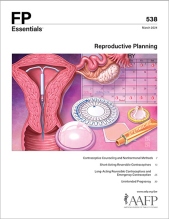
Reproductive planning, especially abortion, has long been a controversial topic, invoking strong emotions and leading to actions by some that significantly affect the decisions of and limit the choices available to others. People of color and those who are socioeconomically disadvantaged or otherwise marginalized and lack access to good health care are the most affected. Health care workers are not free from bias, but if we put our focus on our patients and their needs, we can reduce the barriers they face, provide equitable care, and help them reach their desired health and reproductive goals. The authors of this FP Essentials introduce the principles of reproductive justice and show how these principles can be applied to contraceptive counseling and to situations when patients have an unintended pregnancy. The bulk of this edition provides evidence-based information about contraceptive options to help us advise our patients and better serve their needs.
Section One covers contraceptive counseling and nonhormonal contraception, including over-the-counter options, fertility awareness–based methods, and permanent procedural options. Section Two focuses on the short-acting reversible contraceptives (ie, pills, rings, transdermal patches, injections) and provides useful tips on prescribing them for various patient populations. Section Three covers the long-acting reversible contraceptives (ie, intrauterine devices, subdermal implant) and emergency contraception. Section Four reviews unintended pregnancy and pregnancy options counseling, and discusses parenting, adoption, and abortion. Throughout the edition, the authors emphasize the importance of providing clear, balanced, accurate, and unbiased information to help patients make decisions that are consistent with their own values.
When you have finished studying this FP Essentials and are ready to submit your posttest answers, please tell us what was most useful and what we can do to improve. We look forward to hearing your ideas for topics you would like covered in future editions.
Karl T. Rew, MD, Associate Medical Editor
Associate Professor, Departments of Family Medicine and Urology
University of Michigan Medical School, Ann Arbor
